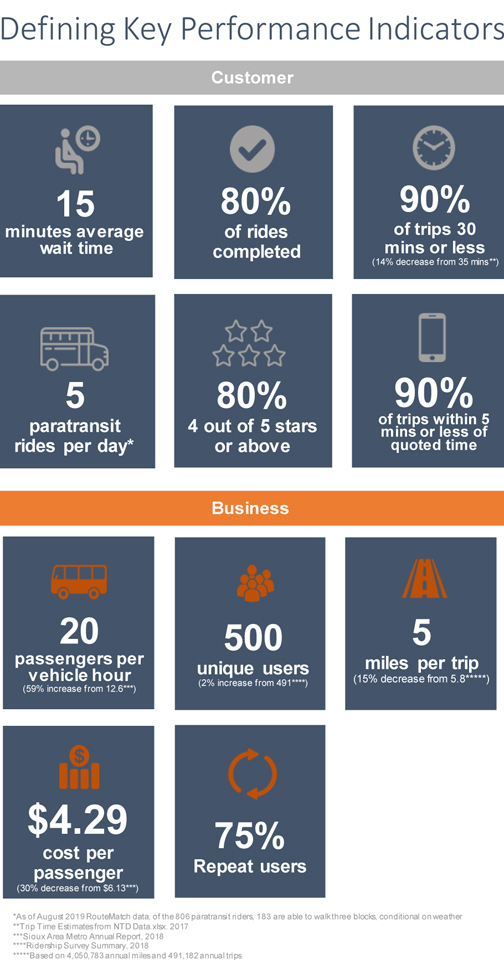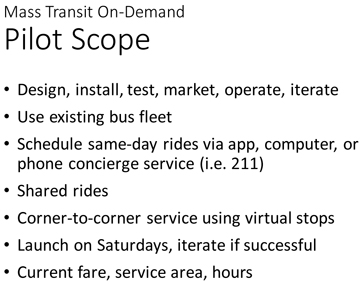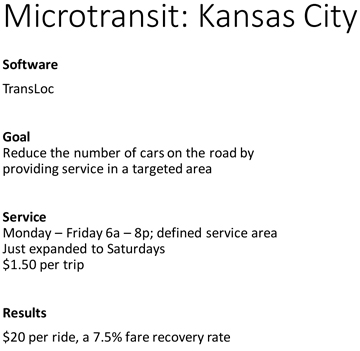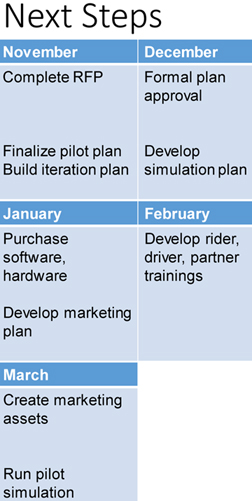On-Demand Transit Pilot RFP
I was able to find the RFP on Friday when it was released.

I was able to find the RFP on Friday when it was released.

What a concept! KC has made public transit FARE FREE and said it will only cost them $8 million a year, but the economic impact is well worth it. DUH!
“I think it would make the bus system stronger, not weaker, and would probably bring in more revenue, not less.â€Â
I also loved this quote from the Editorial board at the KC Star when people asked where they will find the money;
“A good first step would be to stop giving away tax revenue to developers.“
Yeah, maybe the AL Ed board should send the same message to our city leaders. Stop the corporate welfare in this city and we can find the money for all kinds of public programs.
I was finally able to get a copy of the presentation from Monday’s meeting. It wasn’t emailed until Thursday. It is STILL not available online. The city attorney’s office and the clerk’s office needs to have a serious conversation with ALL department heads about the open meetings laws. Two of the attendees (city managers) should have known better since they have both worked for the city for over a decade.
Here is link to what a ‘REAL’ transit study looks like (Done for the City of Missoula, MT)




This email was sent out today from concerned citizens about the transit meeting coming on Monday;
You might want to come to the PTAB meeting on Monday (Oct.28), 3:45pm, if you have an interest in climate change and/or how our bus system might be changed. The “Core Team†(a group of city employees) will present their plan to pilot an “on demand†bus system next year.
Some concerns:
1. If climate change is real, our city’s transit goals must include increased bus ridership, along with more walking and bicycling. Why? Transportation is a major source of greenhouse gas emissions. As far as has been described so far, the plan has NO GOAL or plan for increasing ridership or reducing our city’s carbon footprint.
2. “On demand†plans have been tried in other cities enough now that we know they are less efficient than fixed-route systems. With rare exceptions, few carry more than five riders per hour. Yet our current bus system has only one route averaging less than 10.
3. $190,000 city funds will be used to develop software and education for the on-demand system on Saturdays. Might we ask for matching funds for promoting ridership on the fixed-routes Monday thru Friday? Sioux Falls has never tried a creative, extensive ridership campaign.
4. . . . You may have other concerns, questions, etc. (people who don’t speak English, people who don’t have phones, people with cognitive disabilities, children. …)
At least we will learn more about the pilot project plan (and maybe a better idea of how our city views public transit than was expressed in the Argus* article this past Monday).
The meeting is in the new city building on Dakota Ave, across the street from the downtown library, conference room on the main floor. The agenda and maybe even materials should be posted here by tomorrow (Fri) afternoon:
The bus is too important for people who need it to get to work and get around, and how we do transit is too important to the climate, for us to let this matter slide by.
Thanks for your attention to this even if you can’t come on Monday.
*This line in the Argus article has many citizens concerned;
A team of city staff tasked with revamping the Sioux Falls public transit system of fixed-route busing is readying to launch a pilot program to test whether a request-based ride structure could replace the city-provided service that’s been hemorrhaging taxpayer dollars for decades.
A citizen who sent me the above email had this response to the use of the word ‘hemorrhaging’;
Buses are a city service. Riders’ fares should not be expected to cover the cost. Bus riders are helping to save wear on the streets, reduce greenhouse gas emissions, keep our air clean, reduce traffic congestion, and help reduce the need to use city space and funds for parking. As such, the bus system is a service to all of us. Its costs are costs, not losses, and for sure should not be put in such a negative light as “hemorrhaging”, any more than the costs of streets, police dept, libraries, and other city services.
I would agree. I would also add that a viable transit system adds to economic development. Having a way for people to get to work who can’t drive (for whatever limited reason) saves tax dollars in less government subsidies.
I can’t attend the meeting due to it’s (unfriendly) citizen participation time and a form of ‘soft’ censorship, but I encourage others to let the city know the importance of public transit, and how the ‘big cities’ across this country have found a way to make it viable and useful.
Not sure if this will be a short term experiment, but the Innovation office announced this morning in a DTSF meeting (According to councilor Stehly)Â that they are going to an on demand shuttle service using phone aps.
While I know they have been discussing this for places that are NOT served well by the bus routes, I don’t think going ALL shuttle service would be a good idea. You are going to still need fixed routes, and what about people with NO phones?
Also, what would be the cost of eliminating full-size buses and moving to shuttles?
It will be interesting to hear the details of the plan. I guess we will find out in an informational in July.